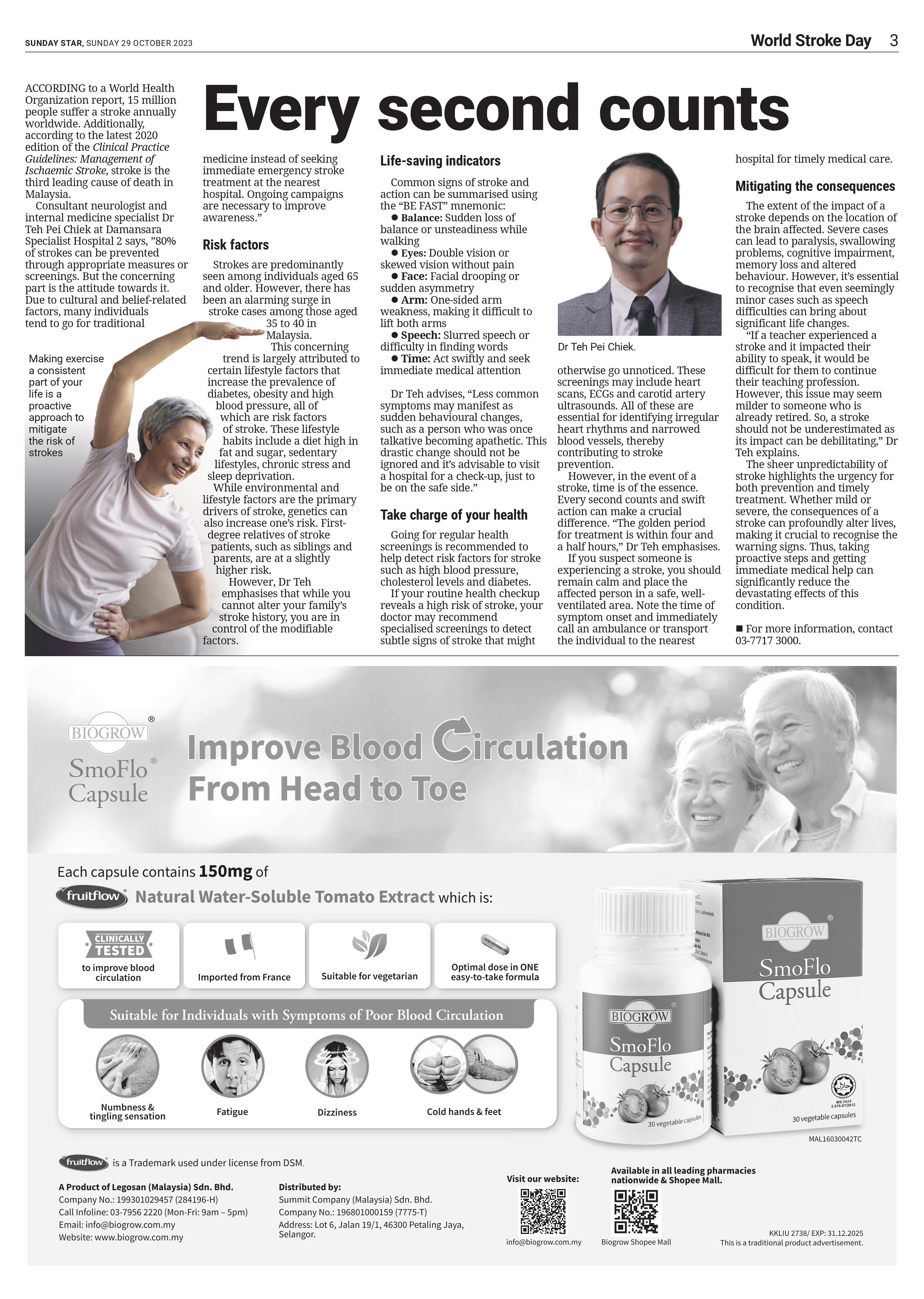World Stroke Day: Every Second Counts

Every Second Counts
ACCORDING to a World Health Organization report, 15 million people suffer a stroke annually worldwide. Additionally, according to the latest 2020 edition of the Clinical Practice Guidelines: Management of Ischaemic Stroke, stroke is the third leading cause of death in Malaysia. Consultant neurologist and internal medicine specialist Dr Teh Pei Chiek at Damansara Specialist Hospital 2 says, ”80% of strokes can be prevented through appropriate measures or screenings. But the concerning part is the attitude towards it. Due to cultural and belief-related factors, many individuals tend to go for traditional medicine instead of seeking immediate emergency stroke treatment at the nearest hospital. Ongoing campaigns are necessary to improve awareness.”
Risk Factors
Strokes are predominantly seen among individuals aged 65 and older. However, there has been an alarming surge in stroke cases among those aged 35 to 40 in Malaysia. This concerning trend is largely attributed to certain lifestyle factors that increase the prevalence of diabetes, obesity and high blood pressure, all of which are risk factors of stroke. These lifestyle habits include a diet high in fat and sugar, sedentary lifestyles, chronic stress and sleep deprivation. While environmental and lifestyle factors are the primary drivers of stroke, genetics can also increase one’s risk. First-degree relatives of stroke patients, such as siblings and parents, are at a slightly higher risk. However, Dr Teh emphasises that while you cannot alter your family’s stroke history, you are in control of the modifiable factors.
Life-saving indicators
Common signs of stroke and action can be summarised using the “BE FAST” mnemonic:
- Balance: Sudden loss of balance or unsteadiness while walking
- Eyes: Double vision or skewed vision without pain
- Face: Facial drooping or sudden asymmetry
- Arm: One-sided arm weakness, making it difficult to lift both arms
- Speech: Slurred speech or difficulty in finding words
- Time: Act swiftly and seek immediate medical attention
Dr Teh advises, “Less common symptoms may manifest as sudden behavioural changes, such as a person who was once talkative becoming apathetic. This drastic change should not be ignored and it’s advisable to visit a hospital for a check-up, just to be on the safe side.”
Take Charge of Your Health
Going for regular health screenings is recommended to help detect risk factors for stroke such as high blood pressure, cholesterol levels and diabetes. If your routine health checkup reveals a high risk of stroke, your doctor may recommend specialised screenings to detect subtle signs of stroke that might otherwise go unnoticed. These screenings may include heart scans, ECGs and carotid artery ultrasounds. All of these are essential for identifying irregular heart rhythms and narrowed blood vessels, thereby contributing to stroke prevention. However, in the event of a stroke, time is of the essence. Every second counts and swift action can make a crucial difference. “The golden period for treatment is within four and a half hours,” Dr Teh emphasises. If you suspect someone is experiencing a stroke, you should remain calm and place the affected person in a safe, well-ventilated area. Note the time of symptom onset and immediately call an ambulance or transport the individual to the nearest hospital for timely medical care.
Mitigating the Consequences
The extent of the impact of a stroke depends on the location of the brain affected. Severe cases can lead to paralysis, swallowing problems, cognitive impairment, memory loss and altered behaviour. However, it’s essential to recognise that even seemingly minor cases such as speech difficulties can bring about significant life changes. “If a teacher experienced a stroke and it impacted their ability to speak, it would be difficult for them to continue their teaching profession. However, this issue may seem milder to someone who is already retired. So, a stroke should not be underestimated as its impact can be debilitating,” Dr Teh explains. The sheer unpredictability of stroke highlights the urgency for both prevention and timely treatment. Whether mild or severe, the consequences of a stroke can profoundly alter lives, making it crucial to recognise the warning signs. Thus, taking proactive steps and getting immediate medical help can significantly reduce the devastating effects of this condition.
Source: The Star Special
For more information, contact 03-7717 3000.




 Promotion
Promotion
 Find Doctor
Find Doctor


